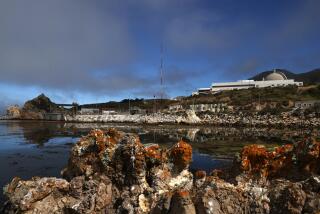The T-Rexes That Just Won’t Die
- Share via
Who will have the courage to slay the T-Rexes along our beaches? I’m talking here about steel T-Rexes, the aging power plants that have loomed over Southern California’s coastline since the end of World War II.
If you’ve ever walked, biked or swam along the coast, you’ve seen them. They ugly up the landscape from Oxnard to Huntington Beach.
By all rights, these dinosaurs should be breathing their last. They are outmoded, inefficient and highly polluting. In the coming era of deregulation they cannot compete with new, cleaner plants that pump out juice at half the cost.
Moreover, the very reason for locating these plants along the coast--the availability of ocean water as coolant--has disappeared with the advent of the new technologies. Modern plants can be located in Vernon as easily as Huntington Beach.
So the old T-Rexes should be dispatched. And we should enjoy the sublime opportunity of recovering our befouled shorelines.
But no. Incredibly, the deregulation authorities have never held a public debate on this opportunity. In fact, the deregulation process has actually worked to ensure that the T-Rexes will continue to fume for years.
*
“It’s unconscionable that these issues are not being discussed, because they are crucial,” says James Caldwell of the Center for Energy Efficiency and Renewal Technology in Sacramento. “Thus far, the process has taken place out of public view, and these questions have fallen through the cracks.”
Just ask the city fathers of Redondo Beach. Sometime in 1996 they began to ask questions about the future of the Southern California Edison plant that has blighted their shore since 1948.
Edison, after all, had announced it was getting out of the power generation business because of deregulation and was putting the Redondo plant, and 10 others, up for sale.
“We saw the opportunity for a new downtown-type development,” says Aaron Jones, the city’s director of economic development. “The site couldn’t be more centrally located and it covers 52 acres. That would make it one of the largest pieces of developable land along the shoreline of the South Bay.”
But instead of embracing the city’s interest, the deregulation honchos rebuffed it. These honchos, of course, would be the ones at FERC and the ISO.
Never heard of FERC and the ISO? Don’t feel bad. No one else has either.
For the record, FERC is the Federal Energy Regulatory Commission. And the ISO is the Independent System Operator, a creation of the deregulation process.
Between them, these virtually invisible organizations control the future of California’s power generation business. After the Redondo officials deciphered the regulatory maze and approached the agencies with their dream of a better city, they got two responses:
First, FERC and the ISO cared not a fig for Redondo Beach’s dream.
Second, FERC and the ISO had already decided--without asking Redondo Beach--about the future of the Redondo plant. Namely, it will remain a power plant.
“We discovered that the plant had been marketed solely to other power companies, not to urban developers,” Jones says. “I puzzle to this day as to why they focused only on power companies.”
Last month, the plant was sold to AES Corp. of Arlington, Va., a power company. All told, Edison sold six coastal plants and each went to a power company.
You may ask, how did Edison manage to sell outmoded plants to other power companies at precisely that moment in history when the new owners will be forced to compete in a free market?
The answer is simple. With virtually no public debate, FERC and the ISO placed these beach monsters in the special designation of “must-run.” That means they must continue making power whether or not they’re competitive, and the public will subsidize their losses.
*
Actually, there are good technical reasons for designating some power plants as “must-run,” mainly having to do with preserving a power balance in the system.
But why the coastal plants? And why no meaningful public debate, especially when our dollars will be paying to subsidize their inefficiencies and filthy emissions?
No one seems to know. The rush toward deregulation has proceeded at such speed that many issues, such as the coastal plants, have simply disappeared or have never been raised in the first place.
In fact, so opaque and haphazard has been the decision-making that the ISO board recently agreed to reopen the issue of which plants will fall into the “must-run” category.
And that may constitute a crucial window of opportunity. Redondo Beach already has appealed for a reversal of its designation. Other beach towns, if they are smart, will join the charge.
Someone has to kill these T-Rexes. It’s time to get out the spears.
More to Read
Sign up for Essential California
The most important California stories and recommendations in your inbox every morning.
You may occasionally receive promotional content from the Los Angeles Times.













